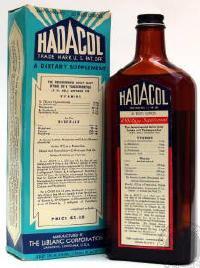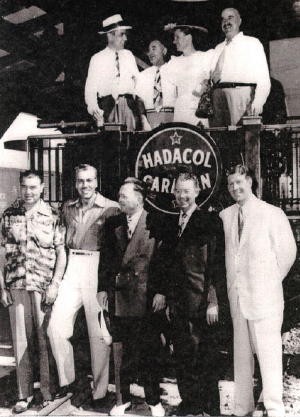SUNNY CAL JOURNAL - The Hadacol Boogie
 THE HADACOL BOOGIE by Bill Nettles
THE HADACOL BOOGIE by Bill Nettles
Down in Lou-'si-an'er in the bright sunshine
They do a little boogie-woogie all the time;
They do-
The Hadacol Boogie, The Hadacol Boogie, The Hadacol Boogie, Makes you boogie-woogie all the time.
A-standin' on the corner with my bottle in my hand
And up steps a mama, said, my Hadacol man.
She done the Hadacol Boogie.
I went down to the farm to rest about a week
But the farmer's wife, she got to walkin' in her sleep;
She done the Hadacol Boogie.
If your radiator leaks and your motor stands still
Give 'er Hadacol and watch 'er boogie up the hill;
She'll do the Hadacol Boogie.
The rooster and the hen, they were standin' in the shade
The rooster done the boogie, while the hen laid the egg;
He done the Hadacol Boogie.
The other little chickens, they gathered around
They done the boogie-woogie, til the sun went down;
They done the Hadacol Boogie.
By Bob Weaver
Life got a little better in the late 40s and early 50s in the Village of Hur with the arrival of Hadacol.
The energy-lifting elixir was advertised on every rural radio station in the south, including 50,000 watt stations like WWVA in Wheeling and WCKY in Cincinnati.
The stations advertised the wackiest of fraudulent potions and imbibments, which were guaranteed to cure everything from athlete's foot to menstrual pains.
Hadacol promised to improve the quality of life, cure ailments, prevent disease and energize.
WCKYs Wayne Raney sold home remedies and down-home products by mail order, usually with the tag "If you order by midnight Sunday, we give you an extra bottle, some beads and a small, framed picture of Jesus."
Dozens of Calhoun boys mail ordered Raney's harmonica, a country music DJ famous for his 1949 hit "Why Don't You Haul Off And Love Me."
Hadacol was a "special formula" with added vitamins, a product of four-term Louisiana state Senator Dudley J. LeBlanc, who was said to have mixed the first batches in his bathtub.
The concoction was labeled as having 12% alcohol as a preservative, but tests indicated it was as high as 24%.
My grandpa and grandma McCoy took it religiously, starting in the morning before farm chores.
Uncle Eddie, who was detoxed from narcotics in the early 40s, couldn't do without it.
It wasn't cheap. The large "family size" (24 ounce) was $3.50 a bottle, no small fee in 1950.
Eddie got his dose from the family bottle in the kitchen, but had his own bottle hidden in his bedroom closet.
Folks in Hur mail-ordered their first batch, but soon the product was available at every country store, particularly in dry counties like Calhoun. McCoy's Store at Hur couldn't keep it in stock.
LeBlanc created other products like Happy Day Headache Powders and Dixie Dew Cough Syrup.
LaBlac's goal was to get customers to take Hadacol three times a day and at bedtime. In addition to radio ads, he promoted it with signs, clocks, a "Captian Hadacol" comic book, plastic thimbles printed with the Hadacol logo, and glasses for taking the diluted mixture.
The McCoy's Hadacol glass sat beside the sink.

Front (left-right) Jack Dempsey, Cesar Romero, Dudley J.
LaBlanc, T.A. Greeson and Rudy Vallee; Minnie Pearl top center
There was the "Hadacol Caravan," the last of the big-time medicine shows, where LaBlanc brought in such luminaries as Milton Berle, Lucille Ball, Mickey Rooney, Bob Hope, Cesar Romero, Dorothy Lamour, Carmen Miranda, Minnie Pearl, George Burns and Gracie Allen, Judy Garland, Jack Dempsey, Chico Marx, Hank Williams, Rudy Vallee, and Jimmy Cagney. They all marketed the product.
Eventually, the FTC said it was an illegal product and company investors pulled the plug. Hadacol was no more.
The absence of the product left a real void in the McCoy family, falling back into generalized malaise.
There was still Lightning Hot Drops and Lydia Pinkhams. Uncle Eddie filled the gap with vodka, which he used medicinally until he died.
Groucho Marx asked LaBlanc in 1952 what Hadacol was good for. LeBlanc gave an answer of startling honesty. "It was good," the senator said, "for five and a half million for me last year."
Nasal-whining Wayne Raney went on to record another hit "Pardon my Whiskers," ran a chicken farm and made a few guest appearances on TVs "Hee Haw" before he passed in 1993.